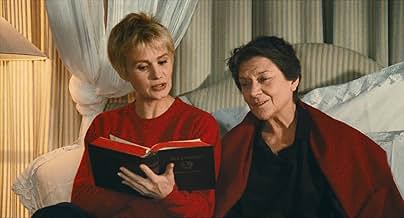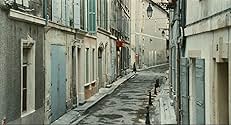La Lectrice
- 1988
- Tous publics
- 1h 39min
NOTE IMDb
7,0/10
1,9 k
MA NOTE
Constance aime lire. A tel point que ses lectures et ses rêves sont intimement mêlés. Aussi écrit-elle un roman qui raconte les aventures de Marie, une jeune femme qui aime tellement la lect... Tout lireConstance aime lire. A tel point que ses lectures et ses rêves sont intimement mêlés. Aussi écrit-elle un roman qui raconte les aventures de Marie, une jeune femme qui aime tellement la lecture qu'elle décide de devenir lectrice à domicileConstance aime lire. A tel point que ses lectures et ses rêves sont intimement mêlés. Aussi écrit-elle un roman qui raconte les aventures de Marie, une jeune femme qui aime tellement la lecture qu'elle décide de devenir lectrice à domicile
- Réalisation
- Scénario
- Casting principal
- Récompenses
- 4 victoires et 8 nominations au total
María Casares
- La veuve du général
- (as Maria Casarès)
Avis à la une
The output of director Michel Deville is difficult to categorise, assuming one feels the need to do so. He is nothing if not varied. Between 1985 and 1988 he gave us the erotic thriller 'Peril en la Demeure', probably his most successful film, followed by the bizarre and surreal 'Paltoquet' which must be accounted a noble failure and finally the delightful 'La Lectrice'.
This is to my knowledge the only one of Raymond Jean's novels to be filmed so all credit to Michel and Rosalinde Deville for spotting the potential. It is the type of film generally referred to as being 'very French'. If by that is meant stylish, literate, well-constructed, tastefully erotic and caring more about character than plot then it certainly qualifies.
It is essentially about where reality finishes and fantasy begins as Constance the book lover and Marie the professional book reader, both played by the sensuous and enchanting Miou-Miou, call to mind very strongly William Styron's observation that 'one lives several lives while reading.'
The rather quirky clients who hire her to read aloud to them prefer subject matter that reflects their lives and predilections. The handsome young man confined by an accident to a wheelchair asks her to read one of Baudelaire's most erotic poems, one of six of his that were banned in 1857. The lonely businessman has a taste for pornography but has to settle for 'The Lover' of Duras although in his case Marie's actions speak louder than words. The general's widow loves the prose of Karl Marx(!?) whilst the magistrate has a penchant for de Sade's '120 Days of Sodom.' The expression on Marie's face when her eyes light upon the extract he has chosen is absolutely priceless.
As the businessman Patrick Chesnais picked up a César and in the cast are two splendid representatives of the 'old school' namely Pierre Dux as the magistrate and Maria Casares as the widow.
The Production Design and Art Direction are superb and Deville again utilises classical music to great effect. Here it is Beethoven who does the honours.
This piece is really to do with the power of words and how vital they are in both enriching the mind and unlocking the imagination. As such, alas, it is a voice crying in the wilderness to so many of the current generation who spend their waking hours glued to screens.
This is to my knowledge the only one of Raymond Jean's novels to be filmed so all credit to Michel and Rosalinde Deville for spotting the potential. It is the type of film generally referred to as being 'very French'. If by that is meant stylish, literate, well-constructed, tastefully erotic and caring more about character than plot then it certainly qualifies.
It is essentially about where reality finishes and fantasy begins as Constance the book lover and Marie the professional book reader, both played by the sensuous and enchanting Miou-Miou, call to mind very strongly William Styron's observation that 'one lives several lives while reading.'
The rather quirky clients who hire her to read aloud to them prefer subject matter that reflects their lives and predilections. The handsome young man confined by an accident to a wheelchair asks her to read one of Baudelaire's most erotic poems, one of six of his that were banned in 1857. The lonely businessman has a taste for pornography but has to settle for 'The Lover' of Duras although in his case Marie's actions speak louder than words. The general's widow loves the prose of Karl Marx(!?) whilst the magistrate has a penchant for de Sade's '120 Days of Sodom.' The expression on Marie's face when her eyes light upon the extract he has chosen is absolutely priceless.
As the businessman Patrick Chesnais picked up a César and in the cast are two splendid representatives of the 'old school' namely Pierre Dux as the magistrate and Maria Casares as the widow.
The Production Design and Art Direction are superb and Deville again utilises classical music to great effect. Here it is Beethoven who does the honours.
This piece is really to do with the power of words and how vital they are in both enriching the mind and unlocking the imagination. As such, alas, it is a voice crying in the wilderness to so many of the current generation who spend their waking hours glued to screens.
I just rewatched this as I was converting it from my ancient cable taped vhs to dvd-r. Shinwa's comments describe this film about as well as one can in a capsule review. Or mabye I'm just becoming older and more curmudgeonly. The literary components seem like they were derived in the manner of Surrealist poetry-- chop up a bunch of sentences cut from books and magazines and pull them from a bag one at a time. Certainly there is no moral triumph taking place because Constance/Marie won't read Sade to a bunch of geezers. In fact, it's a cop-out to the "profession" she's field testing, kind of like a librarian not adding books to the collection because of personal bias. What I enjoyed most about this film is the soundtrack, and the wonderful settings. Love those old world cramped French streets and crumbling buildings with bad plumbing, which we see every time Constance goes trekking between appointments. Now if you want real French comedy, watch for Alexandre le bienheureux if it's ever released on video.
A woman in bed starts to read a story to her husband about a woman who visits people and reads to them... Confused? You needn't be. Despite some unusual links between reality and fantasy, this is easy to follow and engaging.
It's inventive without being in love with itself. The staging is fantastic without feeling contrived. It's made with the kind of lightness of touch you need for this kind of film and isn't the kind of thing I've seen coming out of America for some time.
This isn't your usual comedy or romance. It is very French. I don't mean this as an insult. There is fantastic set design, some lovely comic moments and a lilting feel to the music.
Probably not for everybody but if you like a subtle, gently funny, literate and unconventional film then watch this.
It's inventive without being in love with itself. The staging is fantastic without feeling contrived. It's made with the kind of lightness of touch you need for this kind of film and isn't the kind of thing I've seen coming out of America for some time.
This isn't your usual comedy or romance. It is very French. I don't mean this as an insult. There is fantastic set design, some lovely comic moments and a lilting feel to the music.
Probably not for everybody but if you like a subtle, gently funny, literate and unconventional film then watch this.
One evening in bed a young woman (Miou-Miou) begins to read a book called "La Lectrice" to her husband. It tells the story of Marie (Miou-Miou again), who decides to place an advert in her local newspaper offering her services as a reader. This results in her being hired by a wide range of the town's inhabitants, often with unexpected results. A teenage boy in a wheelchair (Regis Royer) asks her to read Maupassant and Baudelaire; the Hungarian widow of a general (Maria Cazares) selects her favourite passages from the works of Marx and Lenin; a businessman (Patrick Chesnais) with no time to read seems to be more interested in Marie than in the book she is reading; a young girl (Charlotte Farran) whose mother is too busy to read to her requests Alice In Wonderland. The town's authorities are constantly suspicious of Marie's new profession and the strange effect it seems to be having on some of her clients.
The complex structure of the film is a delight, constantly switching between scenes involving Marie and her clients and those from the books she is reading. Strong sensual overtones emerge as some of the clients confuse the services Marie is offering with those they imagine she is offering.
Miou-Miou is excellent in the role of Marie, the southern town of Arles in winter looks magnificent, and the whole thing is driven along by the music of Beethoven. The overall effect is to heighten the viewer's interest in books and reading and make them want to seek out some of the books included in the film. Highly recommended for bibliophiles everywhere.
The complex structure of the film is a delight, constantly switching between scenes involving Marie and her clients and those from the books she is reading. Strong sensual overtones emerge as some of the clients confuse the services Marie is offering with those they imagine she is offering.
Miou-Miou is excellent in the role of Marie, the southern town of Arles in winter looks magnificent, and the whole thing is driven along by the music of Beethoven. The overall effect is to heighten the viewer's interest in books and reading and make them want to seek out some of the books included in the film. Highly recommended for bibliophiles everywhere.
The basic virtue of this beautiful film is to preserve and use, in beautiful manner, all the flavors of the novel. The second, no doubts, Miou - Miou. But she can not be exactly surprising. A film about books and the adventures having the books as seeds. More precise, a film about freedom.
Le saviez-vous
- AnecdotesFrance's official submission to the 1989's Oscars in the Best Foreign Language Film category.
Meilleurs choix
Connectez-vous pour évaluer et suivre la liste de favoris afin de recevoir des recommandations personnalisées
- How long is The Reader?Alimenté par Alexa
Détails
Box-office
- Montant brut aux États-Unis et au Canada
- 699 397 $US
- Montant brut mondial
- 699 397 $US
Contribuer à cette page
Suggérer une modification ou ajouter du contenu manquant

























